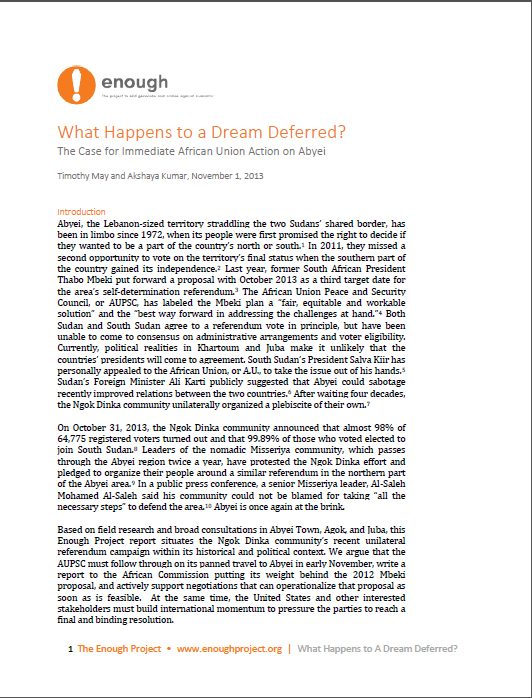
Introduction
Abyei, the Lebanon-sized territory straddling the two Sudans’ shared border, has been in limbo since 1972, when its people were first promised the right to decide if they wanted to be a part of the country’s north or south. In 2011, they missed a second opportunity to vote on the territory’s final status when the southern part of the country gained its independence. Last year, former South African President Thabo Mbeki put forward a proposal with October 2013 as a third target date for the area’s self-determination referendum. The African Union Peace and Security Council, or AUPSC, has labeled the Mbeki plan a “fair, equitable and workable solution” and the “best way forward in addressing the challenges at hand.” Both Sudan and South Sudan agree to a referendum vote in principle, but have been unable to come to consensus on administrative arrangements and voter eligibility. Currently, political realities in Khartoum and Juba make it unlikely that the countries’ presidents will come to agreement. South Sudan’s President Salva Kiir has personally appealed to the African Union, or A.U., to take the issue out of his hands. Sudan’s Foreign Minister Ali Karti publicly suggested that Abyei could sabotage recently improved relations between the two countries.6 After waiting four decades, the Ngok Dinka community unilaterally organized a plebiscite of their own.
On October 31, 2013, the Ngok Dinka community announced that almost 98% of 64,775 registered voters turned out and that 99.89% of those who voted elected to join South Sudan. Leaders of the nomadic Misseriya community, which passes through the Abyei region twice a year, have protested the Ngok Dinka effort and pledged to organize their people around a similar referendum in the northern part of the Abyei area. In a public press conference, a senior Misseriya leader, Al-Saleh Mohamed Al-Saleh said his community could not be blamed for taking “all the necessary steps” to defend the area.10 Abyei is once again at the brink.
Based on field research and broad consultations in Abyei Town, Agok, and Juba, this Enough Project report situates the Ngok Dinka community’s recent unilateral referendum campaign within its historical and political context. We argue that the AUPSC must follow through on its panned travel to Abyei in early November, write a report to the African Commission putting its weight behind the 2012 Mbeki proposal, and actively support negotiations that can operationalize that proposal as soon as is feasible. At the same time, the United States and other interested stakeholders must build international momentum to pressure the parties to reach a final and binding resolution.
View or download images from the Enough Project’s recent trip to the region.
Explore the interactive timeline below.

